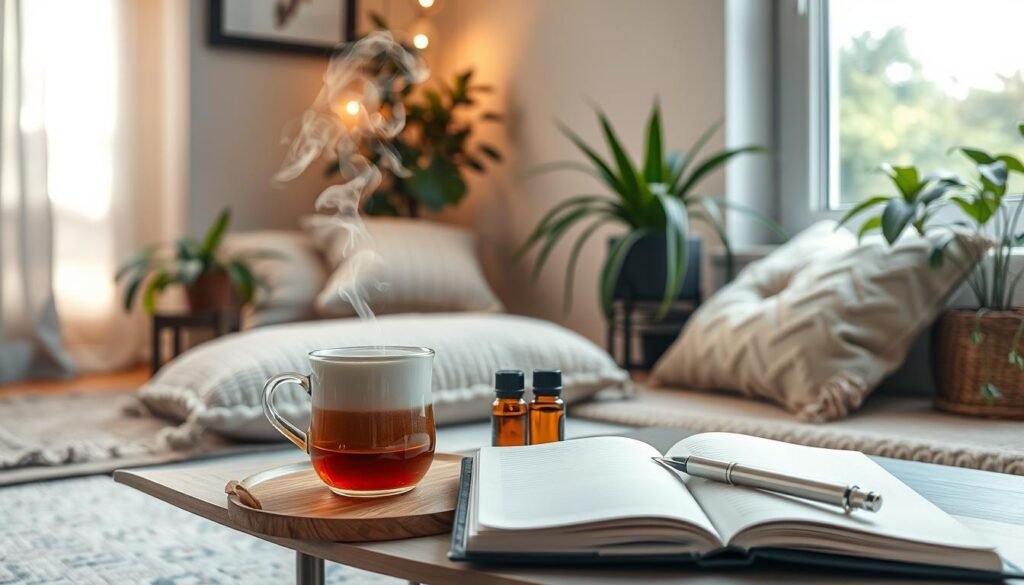Anxiety disorders touch an impressive number of people – around 40 million U.S. residents who are 18 or older. Despite the widespread issue, the severity of anxiety attacks is often underestimated. Normally, these episodes are brief, with most lasting only a few minutes to half an hour. However, it’s possible for the uncomfortable feeling of high anxiety to hang around for much longer, even days. This prolonged state might be a sign of serious conditions like Generalized Anxiety Disorder (GAD). Knowing the symptoms of lasting anxiety is key to coping with its effects on life.
Living with ongoing anxiety can deeply affect one’s emotional health. It’s important to spot the signs of prolonged anxiety symptoms. These include lasting nervousness and difficulties in getting enough sleep. If these feelings are getting in the way of day-to-day tasks, it’s time to seek Chronic Anxiety Treatment. Getting help from a professional is crucial for improving the situation.
Key Takeaways
- Anxiety disorders impact about 40 million U.S. adults.
- Most anxiety attacks last between a few minutes and half an hour.
- Prolonged anxiety can indicate Generalized Anxiety Disorder (GAD).
- Symptoms may include persistent nervousness and trouble sleeping.
- Professional help is essential when anxiety affects daily life.
- Anxiety and depression often occur together.
Understanding Anxiety Attacks
Anxiety attacks happen when stress or perceived threats overwhelm someone. Symptoms include physical and emotional responses. The Understanding Anxiety Disorders emphasizes recognizing these signs early.
Symptoms usually peak within ten minutes and often get better within thirty minutes. Most panic attacks last from five to twenty minutes. But, they can last up to an hour on rare occasions. Continuous attacks over days are rare. Some people might have them once or twice a month, while others may have several each week.
Cognitive-behavioral therapy helps about seventy percent of participants within eight weeks. For support, Grouport Therapy offers online group sessions in Florida, New York, and New Jersey. Staying active and eating well are key in controlling anxiety.
Difference Between Anxiety Attacks and Panic Attacks
It’s crucial to know the difference between anxiety attacks and panic attacks for good management. Anxiety vs. Panic Attacks tells us they are not the same. Anxiety attacks grow slowly and are often due to specific stressors, like work or personal problems. They can be intense and might last a long time.
Panic attacks, however, come on suddenly and are very intense. They can be short, from a few seconds to 20 minutes, but might happen one after another. This makes them feel longer. During a panic attack, you might feel your heart race, have trouble breathing, and feel very scared, as if something awful is happening.
People can have panic attacks because of different things, including stress, being in social places, or after something scary has happened. These attacks can make people scared of having another one. This makes it harder to find the right help. Reading about Distinguishing Anxiety Attacks from panic attacks shows why knowing the difference is key for getting the right treatment.
Also, things like ongoing stress and using drugs or alcohol can make anxiety and panic attacks worse. Knowing what your symptoms are and what triggers them is very important. When you understand the differences between anxiety vs. panic attacks, you can look for the best help and ways to deal with them.
Can Anxiety Attacks Last for Days?
Can anxiety attacks last more than a few minutes? Yes, they can last a lot longer, especially for people with anxiety disorders. While panic attacks typically peak quickly and last about 30 minutes, they can stretch over days. This happens more often to those who are dealing with ongoing anxiety issues.
Signs of Prolonged Anxiety
Prolonged anxiety shows up in various ways, hurting daily life. People might feel:
- Persistent nervousness
- Difficulty concentrating
- Ongoing feelings of dread
- Issues with sleeping
This can make someone wonder, Can Anxiety Attacks Last for Days? Spotting these signs early is key to getting the right help.
When Anxiety Turns into a Disorder
When anxiety dramatically affects daily life, it might become Generalized Anxiety Disorder (GAD). Treating chronic anxiety often means needing professional help. Anxiety signs can change and may require therapy or medication. It’s important to know when worry turns into a long-term problem.
Getting advice from mental health pros can help manage symptoms. They make sure anxiety doesn’t take over. To learn more, check out this article.

Common Symptoms of Anxiety Disorders
Anxiety disorders affect people in different ways. This affects both body and mind. It’s important to know the Anxiety Disorder Symptoms. This knowledge helps in finding the right help and treatment. Here’s a look at common symptoms of these disorders.
Physical Symptoms
Anxiety shows up in the body in several ways. People may feel:
- Accelerated heart rate
- Shortness of breath
- Excessive sweating
- Trembling or shaking
- Digestive problems and headaches
- Sleep disturbances
These symptoms can disrupt daily activities. It’s key to understand how these symptoms relate to anxiety disorders. This understanding is crucial for managing them effectively.
Emotional Symptoms
Anxiety isn’t just physical. It often brings strong feelings of worry and fear. Among the emotional symptoms are:
- Constant worry about what’s coming
- Irritability and restlessness
- Hard time focusing
- Feelings of being overwhelmed or helpless
Dealing with both physical and emotional symptoms can make daily tasks hard. For more on these symptoms and managing them, check out WebMD.
Understanding the physical and emotional aspects of anxiety is crucial. It leads to taking key steps for recovery. Since symptoms vary, finding treatment that works for you is important.
Triggers for Anxiety Attacks
Knowing triggers for anxiety is key for those with anxiety attacks or panic episodes. Triggers range from work stress, big life changes, to relationship issues. Everyone reacts differently to these stressors, making identifying anxiety triggers critical for managing symptoms.
Long-term anxiety can make people more prone to future attacks. Spotting common triggers helps handle anxiety before it turns into full-blown panic. Such triggers include:
- Public speaking or social interactions
- Traumatic events or PTSD
- Substance use, such as caffeine or alcohol
- Stressful changes at work or home
- Health concerns
To tackle identifying anxiety triggers, a layered strategy is needed. One should not only identify triggers but also learn coping mechanisms and seek professional advice. For more info, read about how anxiety attacks can manifest. Understanding these triggers early is key to breaking the cycle of anxiety.

A healthy lifestyle is crucial too. Eating well, regular workouts, and enough sleep greatly reduce anxiety. By knowing their triggers, individuals can overcome anxiety’s tight hold. They take back control over their mental health.
Managing Prolonged Anxiety Symptoms
Managing Prolonged Anxiety means learning how to deal with its signs to get better. There are many ways to help those feeling anxious, especially if it happens a lot. Using methods like deep breathing and grounding helps soothe stress.
Breathing and Grounding Techniques
Deep breathing is important for lessening anxiety. Focusing on breathing slowly helps relax. Grounding methods help during anxious times. These include paying attention to what you see, hear, and smell to distract from anxious thoughts. Let’s look at some techniques:
| Technique | Description |
|---|---|
| Deep Breathing | Inhale for four counts, hold for four counts, exhale for four counts. Repeat to induce calm. |
| 5-4-3-2-1 Exercise | Identify five things you can see, four you can touch, three you can hear, two you can smell, and one you can taste to ground yourself. |
| Mindfulness Meditation | Focus on the present moment, observing thoughts and feelings without judgment to create a sense of peace. |
Recognizing and Avoiding Triggers
It’s key to know what makes your anxiety spike. Certain stressors can worsen it. Keeping a diary to spot trends can help find out these triggers. This helps plan how to handle anxiety better.
- Avoiding known stressors when possible
- Communicating needs to supportive friends or family
- Engaging in regular physical activity to reduce anxiety
- Practicing relaxation techniques regularly
Handling Anxiety Episodes can really help improve your life. Knowing when to get help from experts adds to this, leading to a happier, more stable life.

Seeking Professional Help for Anxiety Disorders
When anxiety takes over your day and messes with your life, getting help is key to getting better. Anxiety disorders include a bunch of mental health issues. People with these issues face big impacts on how well they live. Seeking Professional Help early on means you get the right support and treatments that fit you.
There are different Anxiety Disorder Treatments you can try, like talking therapies or meds. Cognitive-behavioral therapy (CBT) is one good way to deal with it. It helps you see and change bad thinking habits. Studies show many folks feel better from anxiety after just five to eight CBT sessions.
Meds can help too, with SSRIs and SNRIs being popular choices. These meds work on your brain’s chemicals to lower anxiety. But, it’s super important to keep in touch with doctors about how well the meds work and any side effects.
Knowing why you feel anxious can make treatments work better. Looking into your past might show stress, genetics, or learned behaviors causing anxiety. Support from therapists or counselors gives you the tools to tackle these issues during your treatment.
Anxiety Relief Techniques
People with high anxiety can use Anxiety Relief Techniques to help. Doing regular exercise is good for your mind. You don’t need hard workouts; walking or yoga works well for relaxation.
Deep breathing exercises also help a lot. They make you feel better emotionally and more focused. Even a little practice of deep breathing can have big benefits.
Meditation is becoming more popular for handling anxiety. Techniques like mindfulness help you stay calm in tough times. Cognitive Behavioral Therapy (CBT) is also great for treating different anxiety issues.
Making changes in your lifestyle can help with anxiety. Drinking enough water, eating healthy, and not having too much caffeine can help your mind stay steady. Using plants like lavender can also help make you feel less anxious.
| Technique | Description | Research Findings |
|---|---|---|
| Physical Exercise | Regular activity can boost mood and reduce anxiety. | May lower the chance of developing anxiety (2021 study). |
| Deep Breathing | Focus on deep, diaphragmatic breathing to promote relaxation. | Improved emotional well-being reported after practice. |
| Meditation | Mindfulness practices can help calm the mind. | Effective in fostering calm in stressful situations. |
| Lifestyle Changes | Hydration, balanced diet, avoiding stimulants. | Positive correlation between lifestyle and anxiety levels. |
| CBT | Therapeutic approach to understand and change thought patterns. | Moderately effective in treating anxiety disorders. |
Having friends and family around who support you is important. They give you a safe place to share feelings and help lower your anxiety. Using all these methods together, you can create a plan that fits you, making your life with anxiety better.
Conclusion
Anxiety attacks can really change how a person lives every day. It’s super important to know the difference between anxiety and panic attacks. This is because they need different ways to handle them. Panic attacks hit fast and end quickly. But anxiety attacks can last longer, making the person feel worse over time.
To deal with anxiety better, it takes work and help from others. Doing things like staying calm, exercising, and changing some parts of your life can help a lot. It’s also key to know what makes your anxiety worse and to keep up with good habits.
There’s a lot of help out there, too. Talking to doctors or therapists can give you advice on how to feel better. They can show you ways to deal with your anxiety. With the right kind of support, people can get back to enjoying their life and start to heal.